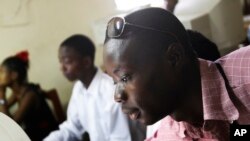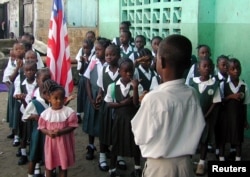Liberian education minister George Werner said the government is not privatizing the nation’s public education system. Rather, he said, it is entering into a public-private partnership education plan.
The government has signed a memorandum of understanding with Bridge International Academies, a low-cost nursery and primary private school chain that uses a technology-based approach to provide standardized education to students in developing countries.
The announcement has sparked a firestorm of criticism from teachers, civil society groups, and even the UN special rapporteur on the right to education.
But Minister Werner said the current performance level of Liberian schools requires drastic action.
“We are not trying to privatize public education in Liberia. What we are trying to do is to have a partnership with private providers to manage some schools on behalf of the government. Government will own those schools; government will oversee those schools; the teachers in those schools will be government teachers paid within the regulation of the civil service,” he said.
About 1.5 million children are enrolled in primary school in Liberia, but the government said only 20 percent of the children complete 12th grade. Years of civil war have also taken their toll on the nation’s education system. In 2013, nearly 25,000 students failed the University of Liberia entrance exams.
Werner said the government cannot continue to have students trapped in schools that are not working.
“We have come to the conclusion that going forward the government cannot do it alone. The statistics are grim for us; we do not have sufficient trained and qualified teachers; our teacher attendance is poor, and the learning outcome for every student is dismal. So what we are trying to do is to leverage the best of the private sector in terms of management systems and accountability and governance to improve all of these elements and accelerate learning outcomes for our children wherever they are,” Werner said.
The pilot project will start with about 50 schools. Subject areas include English, mathematics, science, social studies, and moral education, according to the memorandum of understanding. Each teacher will be supplied with an e-reader tablet running Bridge’s operating system and applications to which all lessons and a teacher resource library will be published.
UN special rapporteur on the right to education Kishore Singh has said the proposed venture is a gross violation of the human rights of Liberian children and their education.
Werner said there is no one he knows who knows and understands the UN system better than President Ellen Johnson Sirleaf. He said Singh missed the mark by prejudging the situation.
“He acted on misinformation fed him by the teachers union and their representatives. Let me be frank, the status quo can no longer hold. People who say that the private sector has no role to play in education today are mistaken. I hope they can change their views,” Werner said.
The National Teachers Association of Liberia and some civil society group have also come out against the plan, describing it as out of touch with the local culture.
They said Bridge’s method of using Android mobile phones to teach students, as it does in Kenya and Uganda where most of the teachers used only what is placed on the phone, resulted in the use of unqualified teachers and rote learning.
Werner said the Liberian government will be responsible for overseeing and regulating the partnership schools.
“This is a small experiment for a big problem and we have to try it. We’ve tried many things and they are not working. As I said earlier, our children can no longer wait. Let’s try this; it’s a pilot. If it works which I believe it will, fine. The government can kill if it chooses to,” Werner said.
He said in Kenya, Bridge International Academies operates as a private provider. What is being tried in Liberia is a partnership with the best, vetted private providers to deliver management systems that can improve accountability and governance.
Werner said Liberia has the institutional set up for the technology-based type of learning associated with the pilot.
“There are many parts of the country, from Maryland to Montserrado, to Grand Gedeh, Nimba, and Lofa, and Cape Mount where we have Internet connectivity. We haven’t covered the country in full, but we are well on our way to doing so,” Werner said.
According to the memorandum of understanding, “All teachers will be assessed with the same instruments, approved by government, and pupil growth will be measured over the course of the pilot so that the Ministry can validate the quality of education provided by teachers.”
Werner said work has begun to reform the Liberian teaching workforce, including aptitude tests for teachers to know their training needs so that they can plan better for professional development.
“At the moment, there are few incentives for teachers to perform, and you have in many places irregular pay that affects motivation. So it is not that the teacher training that was done after the war was weak, it is that there has not been adequate accountability systems to hold those teachers accountable enough so that they can show up every day to teach; so that they do not use the teaching job as an entry position where they get on government payroll and then take on another job but nobody knows that they have another job, but they are not showing up in the classroom,” Werner said.
The memorandum of understanding said the government of Liberia “will provide key financial contribution to ensure the success of the pilot project, including “The physical premises, buildings, furnishings and fittings of each pilot school”.
“The Liberian government will continue with costs related to school infrastructure and teachers’ pay. The rest of the money around $10 million or so is coming from private philanthropists,” he said.





